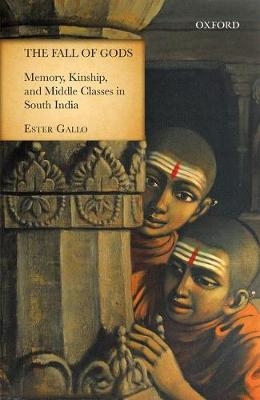
The Fall of Gods
Memory, Kinship, and Middle Classes in South India
Seiten
2017
OUP India (Verlag)
978-0-19-946930-7 (ISBN)
OUP India (Verlag)
978-0-19-946930-7 (ISBN)
Rich in anthropological detail and incisive analyses, The Fall of Gods makes original contributions to the understanding of connection between gendered family relations and class mobility, and foregrounds the complex linkages between political history, memory, and the private domain of kinship relations, in the making of Indias middle classes.
Interrogating the cultural roots of contemporary Malayali middle classes, especially the upper caste Nambudiri community, The Fall of Gods is based on a decade-long ethnography and historico-sociological analyses of the interconnections between colonial history, family memories, and class mobility in twentieth-century south India. It traces the transformation of normative structures of kinship networks as the community moves from colonial to neo-liberal modernity across generations. The author demonstrates how past family experiences of class and geographical mobility (or immobility) are retrieved and reshaped in the present as alternative ways of conceiving kinship, transforming the idea of collective suffering and sacrifice, and strengthening the felt necessity of territorial, caste, and religious mingling.
Rich in anthropological detail and incisive analyses, the book makes original contributions to the understanding of connection between gendered family relations and class mobility, and foregrounds the complex linkages between political history, memory, and the private domain of kinship relations in the making of Indias middle classes.
Interrogating the cultural roots of contemporary Malayali middle classes, especially the upper caste Nambudiri community, The Fall of Gods is based on a decade-long ethnography and historico-sociological analyses of the interconnections between colonial history, family memories, and class mobility in twentieth-century south India. It traces the transformation of normative structures of kinship networks as the community moves from colonial to neo-liberal modernity across generations. The author demonstrates how past family experiences of class and geographical mobility (or immobility) are retrieved and reshaped in the present as alternative ways of conceiving kinship, transforming the idea of collective suffering and sacrifice, and strengthening the felt necessity of territorial, caste, and religious mingling.
Rich in anthropological detail and incisive analyses, the book makes original contributions to the understanding of connection between gendered family relations and class mobility, and foregrounds the complex linkages between political history, memory, and the private domain of kinship relations in the making of Indias middle classes.
Ester Gallo is a lecturer in anthropology at the Department of Sociology and Social Research, University of Trento, Italy, and Research Fellow at the Robert Schuman Centre for Advanced Studies (RSCAS), European University Institute, Florence, Italy.
| Erscheinungsdatum | 28.09.2017 |
|---|---|
| Zusatzinfo | 6 |
| Verlagsort | New Delhi |
| Sprache | englisch |
| Maße | 150 x 222 mm |
| Gewicht | 546 g |
| Themenwelt | Sozialwissenschaften ► Ethnologie |
| Sozialwissenschaften ► Soziologie ► Makrosoziologie | |
| Sozialwissenschaften ► Soziologie ► Mikrosoziologie | |
| ISBN-10 | 0-19-946930-X / 019946930X |
| ISBN-13 | 978-0-19-946930-7 / 9780199469307 |
| Zustand | Neuware |
| Informationen gemäß Produktsicherheitsverordnung (GPSR) | |
| Haben Sie eine Frage zum Produkt? |
Mehr entdecken
aus dem Bereich
aus dem Bereich
queere Heldin unterm Hakenkreuz
Buch | Hardcover (2023)
Kremayr & Scheriau (Verlag)
24,00 €
deutsch-jüdische Lebensgeschichten
Buch | Hardcover (2024)
Wallstein Erfolgstitel - Belletristik und Sachbuch (Verlag)
48,00 €


